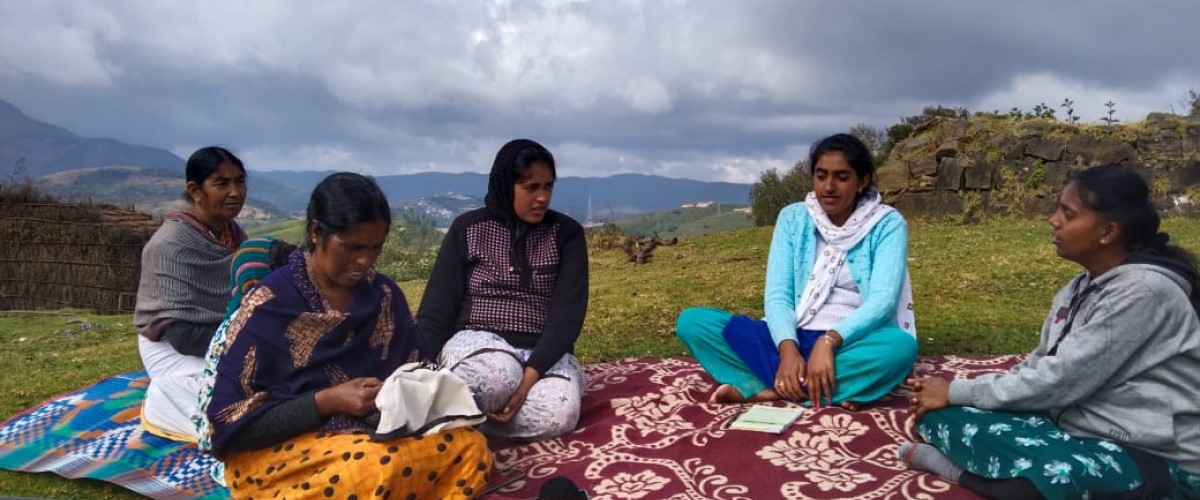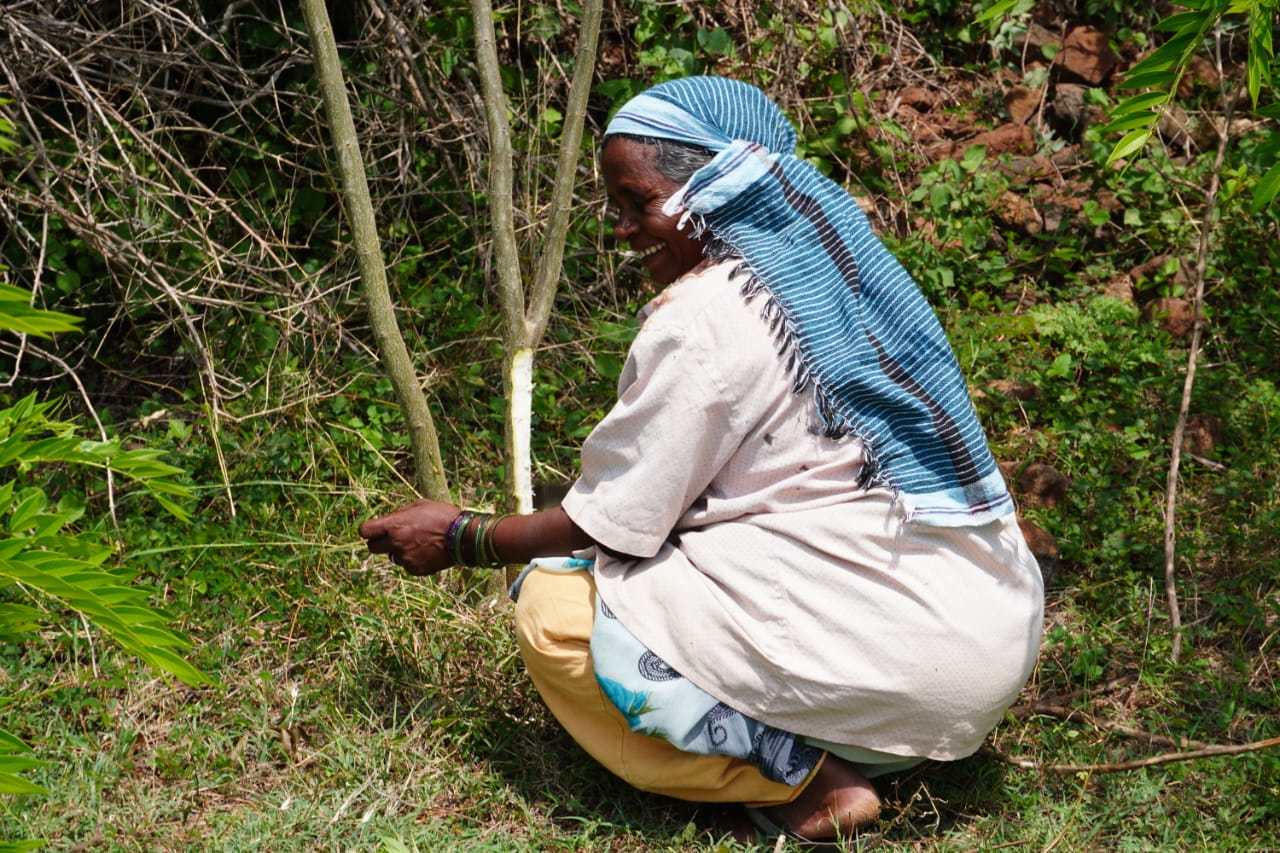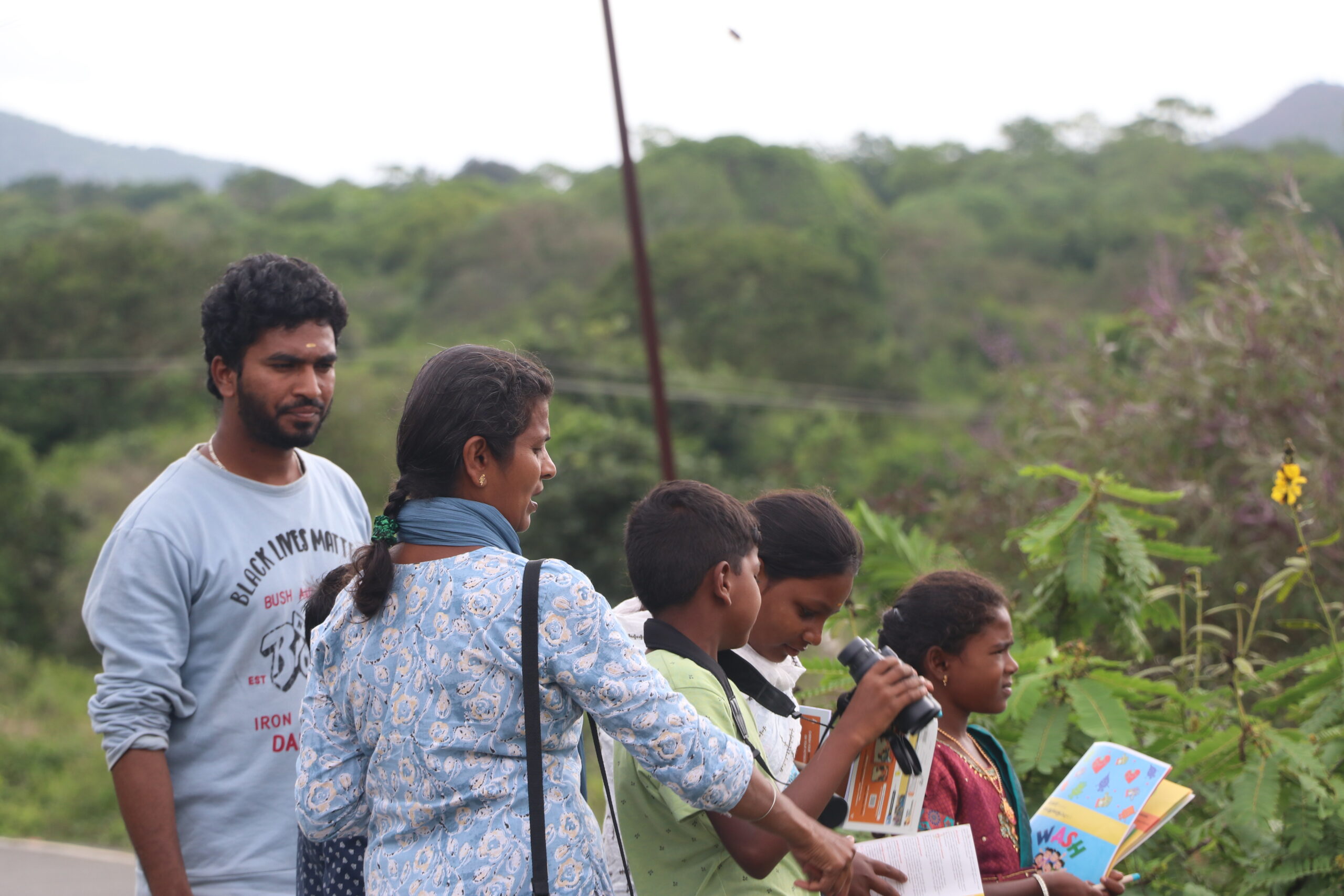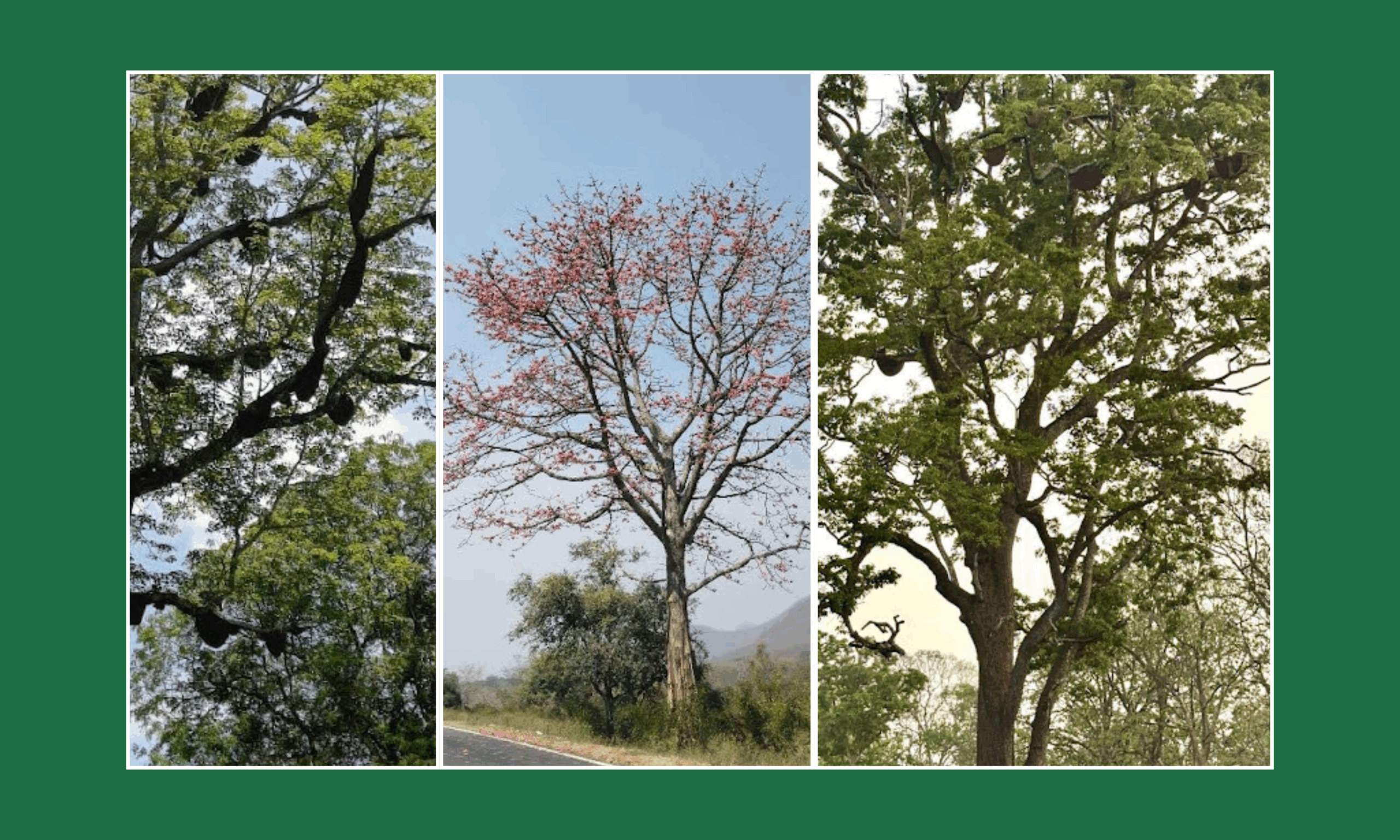October 15, 2023
By Ranjani Prasad & Faisal Rehman
Programme Coordinators, People & Nature Collectives
The PVTG Youth Leadership programme is hosted and Implementation through People & Nature Collectives, Keystone Foundation, (Kotagiri) and supported by Azim Premji Foundation (Bengaluru) and carried out with our project partner Haiyya Foundation (Delhi).
Among the indigenous communities of the Nilgiri Biosphere Reserve (NBR), the Particularly Vulnerable Tribal Groups (PVTG) are currently going through rapid socio-economic and ecological changes in their landscapes, culture, lifestyle, food & nutrition, society and local governance systems. This project (2021-2023) focused on social change and transformation within PVTG communities, especially youth, and attempted to build a cohort of youth leaders who were able to mobilise community action for addressing social and civic needs within their communities.
This project was initiated in 2021 through a Leadership Development Course created by Haiyya Foundation, Delhi. The leadership course was designed to work with 10 Teaching fellows from 10 PVTG groups in Nilgiris Biosphere Reserve, who would each go on to recruit 10 more community youth. The multiplier effect planned for this course made it possible to train nearly 160 indigenous youth on leadership, strategizing and building community support over 6 months. These youth were trained in 2 locations (Wayanad and Kotagiri) and came from the following communities: Irula, Kurumba, Toda, Kota, Paniya, Kattunaickan and Adiya, covering parts of Wayanad, Nilgiris and Coimbatore districts. The youth leaders cohort developed 30+ group projects over six months of training and spent another year building community profiles through insider perspectives on contemporary issues.
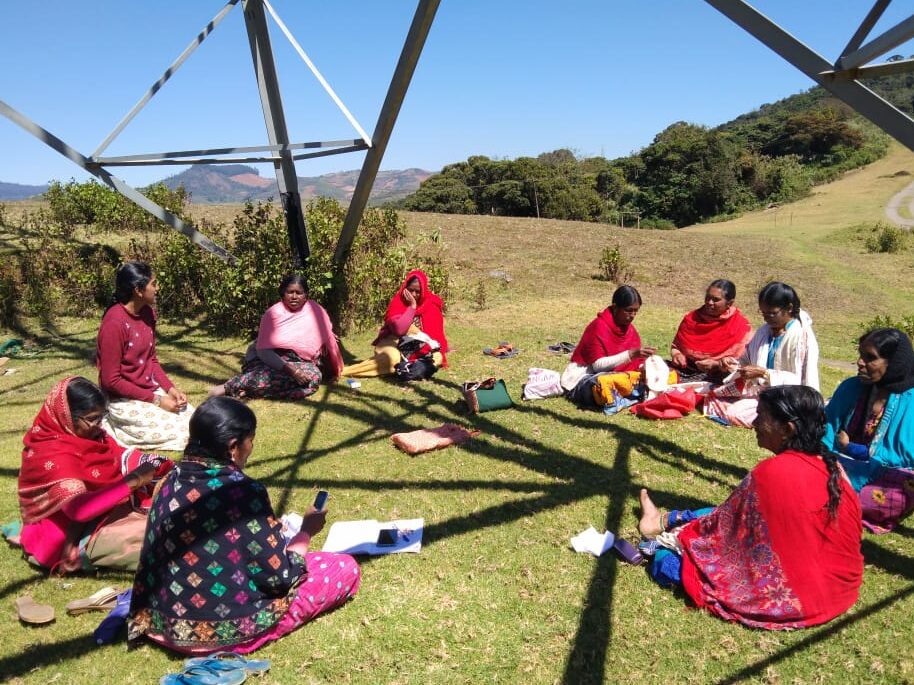
As a closing to the project and to determine future course of this work, two public meetings and stakeholder engagement in Ooty and Wayanad on 17th and 10th October respectively. The key highlight for the year and their projects include:
Community Profiling – Community profiles, initiated by Youth Leaders from PVTG communities, summarize the baseline conditions and trends in their communities and study areas. It establishes the context for assessing their community needs and categorization challenges within Indian socio-legal systems. Currently we have profiles that speak about traditional agriculture, migration, cultural traditions and lifeways, food and medicine, etc. These self-profiles help us understand communities in a deeper way which in turn can help in advocacy and evidence for their cultural and land rights and identity.
Community Projects – The group projects taken up by youth leaders over a 2 year period address and initiate collective action on the social and civic needs, partnership and advocacy with government and civil society and lay foundations for youth leadership in their communities. These projects have so far helped in leveraging government schemes and funds, do baseline surveys in the village, and importantly mobilise communities to strengthen community institutions and governance structures. The projects taken up by youth have also focussed on skill building and knowledge sharing amongst youth.
TAMIL NADU
The public meeting at Tamil Nadu was organised at the HADP Hall (Regional Centre for Tribal Cooperation), Ooty on 17th October 2023 to showcase the youth leaders’ projects and community profiles. The meeting was also held to solicit more suggestions from community elders and important leaders to improve and strengthen efforts of indigenous youth. The event was attended by District Tribal Director, Mr. Selvakumar; Tribal Research Centre Director, Mr. Udaya Kumar; executive functionaries from Nilgiri Adivasi Welfare Association (NAWA) as well as other community leaders from the Toda, Kota, Kurumba, Irula communities. The youth leaders – Laxmanan, Saravanan (Alu Kurumba), Karthigayini (Kota), Prakash (Pillur) and other youth from their communities presented on the various projects they have completed within their communities, including accessing government schemes, facilitating claims to social entitlements, forest rights, etc. Some of them even collectivised themselves to prepare for the Public Service exams, while others organised themselves into a youth group. Some of the women participants enabled consultations within their communities on women’s issues such as menstrual taboos, early marriages, ease of access for educational opportunities, etc. The youth leaders also presented their intent to continue profiling their own communities from within and continue advocacy on overall wellbeing and land & cultural rights of their communities.
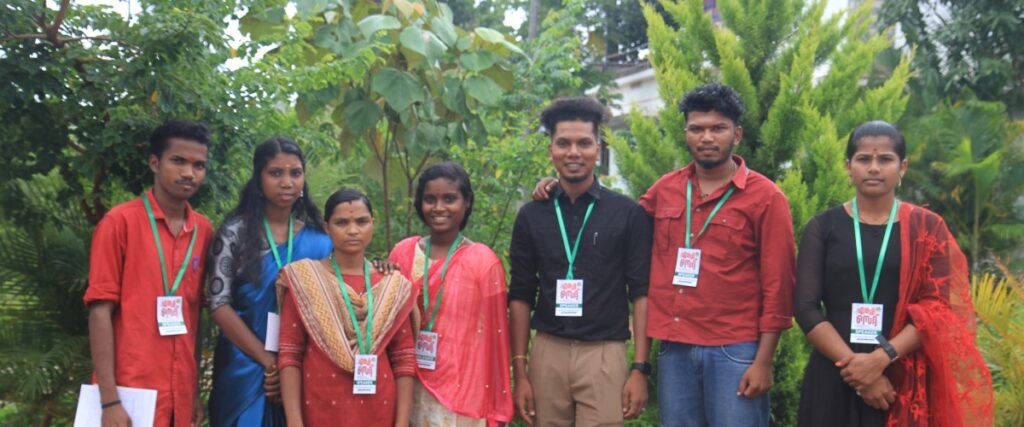
KERALA
By Muhammed Rafi
Project Implementation Assistant
തദ്ദേശീയ ഗോത്രജന വിഭാഗങ്ങളുടെ ഉന്നമനം പൂർണ്ണ അർത്ഥത്തിൽ സാധ്യമാവണമെങ്കിൽ ഗോത്ര വിഭാഗങ്ങൾക്കിടയിൽ നിന്നുതന്നെ അവരെ നയിക്കുന്ന യുവതലമുറ വളർന്നു വരേണ്ടതുണ്ട് എന്ന ചിന്തയിൽ നിന്നാണ് കമ്മ്യൂണിറ്റി ലീഡർഷിപ്പ് പ്രോഗ്രാമിന്റെ മുള പൊട്ടുന്നത്. വയനാട്ടിലെ ഗോത്ര വിഭാഗങ്ങളായ പണിയ, അടിയ കാട്ടു നായിക്ക എന്നീ വിഭാഗങ്ങളിൽ നിന്ന് സാമൂഹിക പ്രതിബദ്ധതയും വിഷയത്തിൽ താല്പര്യവുമുള്ള ആറോളം യുവതി യുവാക്കളെ തെരഞ്ഞെടുത്ത് അവരിലൂടെ പുതിയതായി മറ്റു പത്തു യുവജനങ്ങളെ കൂടി കൂട്ടിച്ചേർത്തുകൊണ്ട് ആറോളം ഗ്രൂപ്പുകൾക്ക് രൂപം നൽകിക്കൊണ്ടാണ് യുവജന നേതൃത്ത പരിപാടിക്ക് തുടക്കം കുറിച്ചത്.
രണ്ടു വർഷം മുൻപ് കീസ്റ്റോൺ ഫൗഡേഷൻ്റെ സഹകരണത്തോടെ തുടങ്ങിയ യാത്ര, രണ്ടുവർഷം പിന്നിടുമ്പോൾ, സ്വന്തം ഊരുകളിൽ നിന്ന് കണ്ടെത്തിയ അടിയന്തരമായി പരിഹരിക്കേണ്ടുന്ന അനേകം വിഷയങ്ങൾ ഊരിലെ ജനങ്ങളെ ചേർത്തുവച്ചുകൊണ്ട് സർക്കാർ സംവിധാനങ്ങളുടെ ഓരം പറ്റി പരിഹാരം കണ്ടെത്തിയത് അഭിമാനകരമയ നേട്ടമാണെങ്കിലും, ഊരുകളിൽ പരിഹരിക്കപ്പെടാൻ അനേകം വിഷയങ്ങൾ ഇനിയും ഉണ്ട് എന്നതാണ് യാഥാർത്ഥ്യം.
ആറു ഗ്രൂപ്പുകളായി തിരിഞ്ഞ് 60 യുവജനങ്ങളിൽ നേതൃത്വ ഗുണവും സാമൂഹിക അവബോധവും വളർത്തിയെടുക്കുകയും, തങ്ങളുടെ ആചാരാനുഷ്ഠാനങ്ങളിലും പാരമ്പര്യങ്ങളിലും പൈതൃകങ്ങളിലും അഭിമാനമുള്ളവരാക്കി തീർക്കുകയും ചെയ്തപ്പോൾ വയനാട്ടിലെ ഗോത്ര വിഭാഗങ്ങൾ പുതിയ ചരിത്ര താളുകളുടെ ആമുഖം പിന്നിടുകയായി.
കമ്മ്യൂണിറ്റി ഡീലർഷിപ്പ് പ്രോഗ്രാം വിദ്യാഭ്യാസം, ഉപജീവനം, അടിസ്ഥാന സൗകര്യ വികസനം, അവകാശ സംരക്ഷണ ബോധവൽകരണ പരിപാടികൾ, പരിശീലന പരിപാടികൾ എന്നിങ്ങനെ വിവിധങ്ങളായ പദ്ധതികൾ ഇതിനോടകം നടപ്പിലാക്കി കഴിഞ്ഞു.
ഗോത്ര വിഭാഗങ്ങളുടെ കലാസാംസ്കാരിക മൂല്യങ്ങളും ആചാര അനുഷ്ഠാനങ്ങളും എല്ലാം പുറത്തുനിന്ന് നോക്കി കണ്ട കാഴ്ചപ്പാടിൽ നിന്നുകൊണ്ട് എഴുതപ്പെട്ടിട്ടുള്ളതാണ് എന്ന തിരിച്ചറിവിൻറെ അടിസ്ഥാനത്തിൽ ഗോത്രിയ വിഭാഗങ്ങളുടെ കുറിപ്പുകൾ ഗോത്ര വിഭാഗങ്ങളാൽ ഗോത്രത്താളുകളിൽ എഴുതപ്പെടേണ്ടതുണ്ട് എന്ന തീരുമാനത്തിന്റെ വെളിച്ചത്തിൽ, ഒരുപാട് വിഷയങ്ങളിൽ നമ്മുടെ യുവജനങ്ങൾ പഠനങ്ങൾ നടത്തുകയുണ്ടയി. തുടർന്ന് ആദിവാസി സമൂഹത്തിൻ്റെ ചരിത്രങ്ങളും ആചാരങ്ങളും സമ്പന്നമായ സാമൂഹിക ജീവിതവും കാഴ്ചപ്പാടുകളും പ്രമേയമായി വരുന്ന പഠന കുറിപ്പുകൾ പ്രസിദ്ധീകരണത്തിന് ഒരുങ്ങുകയാണ്. വിഷയത്തിൽ താൽപര്യം ഉള്ളവരും ഗവേഷണ വിദ്യാർഥികൾ അടക്കമുള്ള പൊതു ജനങ്ങൾക്കും, ഗോത്ര സമൂഹത്തിലെ വരും തലമുറകൾക്കും, വലിയ തിരിച്ചറിവുകൾക്കും പഠനങ്ങൾക്കും വഴിവിളക്കായി തെളിഞ്ഞു നിൽക്കുവാൻ ഈ സെൽഫ് പ്രൊഫൈലിങ്ങ്ന് കഴിയും എന്നതിൽ തർക്കമില്ല.
ഒടുവിൽ “ഏങ്കളെ സെദ്ദ് യുവ ജനങ്ങൾ സംസാരിക്കുന്നു” എന്ന പരിപാടി ഈ യുവ ജനങ്ങളുടെ നേതൃത്വത്തിൽ സംഘടിപ്പിച്ചു. നമ്മുടെ യുവാക്കൾ അവരുടെ രണ്ടു വർഷത്തെ യാത്രയും അതിൽ ഉണ്ടായ പ്രതിസന്ധികളും പ്രശ്നങ്ങളും വലിയ വലിയ സന്തോഷങ്ങളും പ്രിയപ്പെട്ടവർക്ക് വേണ്ടി ആ നിറഞ്ഞ സദസ്സിനെ അഭിസബോധന ചെയ്തു കൊണ്ട് പങ്കുവെച്ചപ്പോൾ ഓർമ്മ വന്നത്, രണ്ടു വർഷങ്ങൾക്കു മുമ്പ് ആദ്യത്തെ പരിശീലന പരിപാടിയിൽ അഞ്ച് ആളുകളുടെ മുമ്പിൽ നിന്ന് സ്വന്തം പേരും ഊരും സ്വന്തം ആശയങ്ങളും ആകുലതകളും ആശങ്കകളും സന്തോഷങ്ങളും പങ്കുവെക്കുവാൻ കഴിയാതെ, കേവലം അഞ്ചു പേർ അടങ്ങുന്ന ചെറിയ സംഘത്തെ അഭിമുഖീകരിക്കുവാൻ കഴിയാതെ നിസ്സഹായരായി നിൽക്കേണ്ടി വരികയും, ഒടുവിൽ പറഞ്ഞു തുടങ്ങിയപ്പോൾ അടിച്ചമർത്തലുകളുടെ, വേർതിരിവുകളുടെ, ഉച്ചനീചത്വങ്ങളുടെ കഥകൾ പുറത്തുവരികയും , തീർത്തും നിസ്സഹായരായി പറഞ്ഞവരും കേട്ടവരും കണ്ണുനീർ വാർത്തു നിൽക്കുകയും ചെയ്ത ആ ആദ്യത്തെ പരിശീലന പരിപാടിയാണ്. പക്ഷേ, ഇന്നവർ സംസാരിക്കുവാൻ തുടങ്ങിയിരിക്കുന്നു ഏതു വലിയ ശക്തിക്ക് മുമ്പിലും തീർത്തും ആർജവത്തോടെ ആത്മവിശ്വാസത്തോടയും അവരുടെ വിഷയങ്ങളെക്കുറിച്ച് സംസാരിക്കുകയും അവരുടെ ആശയങ്ങൾ പറഞ്ഞു തന്നെ മുന്നോട്ടു പോവുകയും ചെയ്യുമ്പോൾ ഇത് വലിയ മാറ്റമാണ് വലിയ മുന്നേറ്റമാണ്. ഒരുപക്ഷേ ഇന്ത്യയിലെ തന്നെ ഗോത്ര വിഭാഗങ്ങൾക്കിടയിൽ നിന്നുള്ള യുവജന നേതാക്കളുടെ ആദ്യത്തെ മുന്നേറ്റം എന്നു തന്നെ വിശേഷിപ്പിക്കാം.
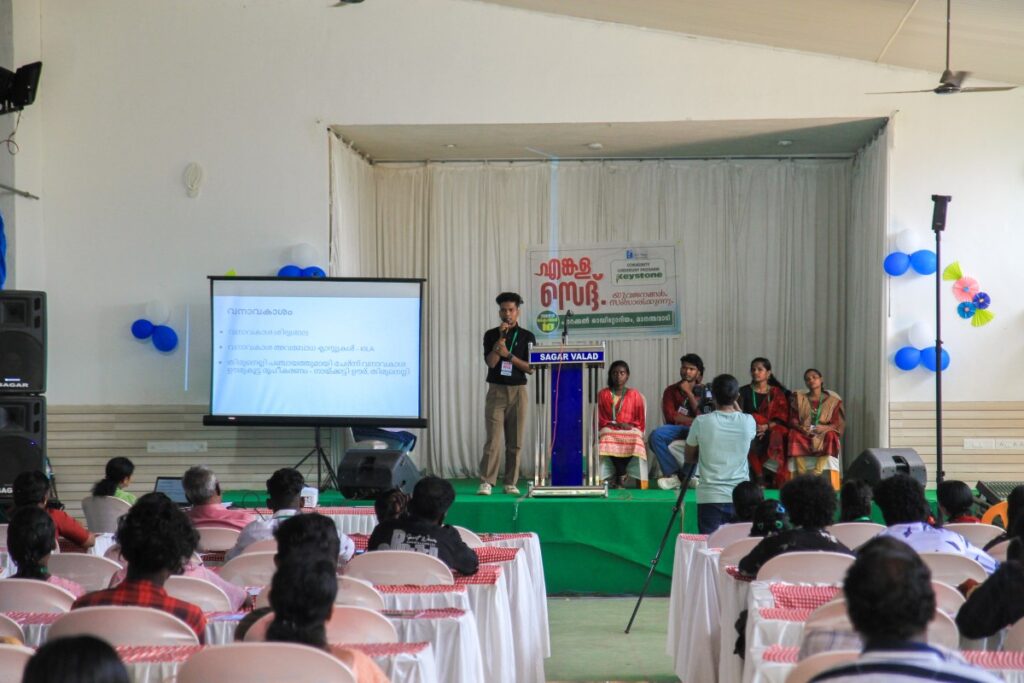
The community leadership programme, also referred to as the tribal youth leadership programme was born out of the thought that if the upliftment of the indigenous tribal communities is to be possible in the full sense, a young generation of leaders must be raised from among the tribal communities themselves. The youth leadership programme was started by selecting six young women from the Paniya and Adiya Kattu Nayika tribal groups of Wayanad who are socially responsible and interested in the topic and through them ten other young people were onboarded to form six groups.
The journey that started two years ago with the cooperation of Keystone Foundation, after two years, many issues that need to be solved urgently in their own villages have been solved by the people of the village.
The tribal groups of Wayanad marked the beginning of new pages of history when they were divided into six groups and inculcated leadership quality and social awareness among 60 youths and made them proud of their customs, traditions and heritage.
The Community Dealership Programme has already implemented various projects like education, livelihood, infrastructure development, rights protection awareness programs and training programs.
In the light of the decision that the records of the tribal groups should be written in the tribal records based on the realisation that the cultural values and rituals of the tribal groups are written from an outside perspective, our youth are conducting studies on many subjects. Then the study notes on the themes of history, customs, rich social life and perspectives of the tribal community are being prepared for publication. There is no doubt that this self-profiling can be a beacon for great realisations and studies for the general public, including research students, and the future generations of the tribal community.
Finally, a programme called “Engale Sedd Yuva Manasana Parunatu” was organized under the leadership of these young people. When our young people shared their two-year journey, the crises, problems and great joys that arose in it, addressing the full audience for their loved ones, I remembered that two years ago, in the first training programme, in front of five people, who could not share their names, addresses, ideas, concerns, worries and joys, only five people were present. It was the first training programme where the small group had to stand helplessly, and when they finally started to tell, the stories of oppression, discrimination, and injustice came out, and those who spoke and listened completely helpless were in tears. But today they are starting to speak in front of any big power, talking about their issues with absolute enthusiasm and confidence and moving forward with their ideas, this is a big change, a big step forward. Perhaps it can be described as the first movement of youth leaders from among the tribal groups in India itself.
By Kavyanjali
Consultant
On October 10, Wayanad saw a beautiful culmination of a two year effort to increase Adivasi youth leadership in the area. The conference, held in the Mananthavadi Parakkal Auditorium, was organized entirely by its young participants, many of whom were speaking on stage for the first time. Despite these firsts, the youth charmed the crowd, from engaging attendants with questions, presenting important data on their work, distributing tasty snacks, and singing beautiful songs. One of these songs was a Gotra song, used as the opening act of Egala Sedd.
The Community Leadership Programme was founded with the intention of bringing together Adivasi youth and creating opportunities for them to identify and solve problems within their communities through their own interventions. In this way, direct changes in tribal communities start with the affected youth of those communities themselves.
The Community Leadership Programme was implemented in both Tamil Nadu and Kerala. In Wayanad, Kerala, 6 youth teams of 60 leaders, primarily from Adiya, Paniya, and Kattunayakka groups were formed following leadership skills training in collaboration with Keystone Foundation.
The 6 youth teams formed were named Naanga, Kattuchola, Namma Koota, Geladh, Pratheeksha, and Chilamb. Through working with six panchayats of the Mananthavady block, the youth teams have been able to identify many basic problems in every village and find solutions to some extent.
The final session was presided over by block panchayat president Justin Baby and Mananthavadi Constituency MLA O.R. Kelu inaugurated the meeting. Keystone Foundation’s Director, Snehalata Nath, and Manikuttan, a social worker from the Paniya community.
Keystone Foundation Programme Coordinator K G Ramachandran and Suresh Nilambur spoke on the occasion. Then the program ended with a visual feast by the tribal art group Thidambu.

